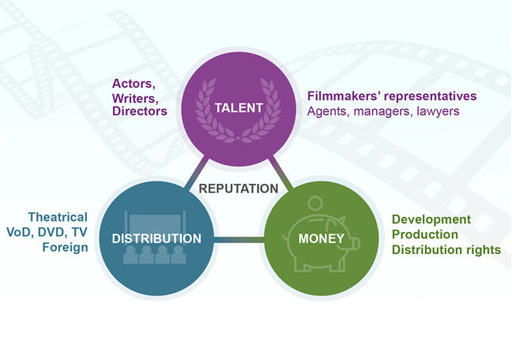3.4 Who has the power?
There are lots of different players in the film industry, and you’ll learn about a lot of them during this course. So who’s in charge? Who has the ability to get things done?
The triangle of power (Figure 8) suggests that there are three key ways for an individual or organisation to have the ‘power’ to get films made in the way they want to.
First, talent always has bargaining power. (‘Talent’ doesn’t mean people that are talented, it mean people who are recognised as talented, i.e. have some kind of star power.)
As in many industries, money talks. Independent films are produced on a project-by-project basis and so need money. Studios like to share the risk of their films by using outside investors. Money always brings power.
Lastly, having a distribution network or capability gives power because it grants the ability to get a film in front of audiences. Without distribution capability, no film will make any money.
Overlaying all this is the matter of reputation. This will be explored further throughout the course, but because film is a ‘deal’ business where people come together to make arrangements all across the value chain, the reputation of someone to actually do what they say they’ll do is crucial.
Do these factors seem different to those in other industries? You might want to think about this if you have experience of working in another sector. Film production is project-oriented, involving freelance workers on large complex processes and making use of lawyers to write contracts for the various agreements. There may be other industries that work in the same way and for which the power factors featured above might apply.

